How a Home Helps your Health
~
By Sponsored
Research shows that a lack of stable housing negatively impacts a person’s health. And amid the COVID-19 pandemic, even more people may become housing insecure in the coming months.
Nationwide, there is a growing lack of affordable rental housing and unequal access to homeownership, a recent report by the Joint Center for Housing Studies at Harvard University found. What can a health insurer do to bolster housing opportunities for people?
In Episode 4, host Ellen Beckjord talks with John Lovelace, president, Government Programs and Individual Advantage Products for UPMC Health Plan.
John discusses innovative housing partnerships through the Health Plan aimed at helping individuals gain stable, permanent housing. Working with the nonprofit Community Human Services, the insurer helps steer its members to housing through the Cultivating Health for Success program.
That program launched in 2010, as a means to bring people in the Medicaid program to permanent housing, with social support as needed. Those who are homeless, housing insecure, or live with a disability are among those eligible to participate.
At a time when more people feel housing insecure due to the pandemic UPMC Health Plan is continuing to explore opportunities to partner with housing authorities throughout Pennsylvania to expand this program. Across the country, more health care organizations are working to bring housing to people who need it.
The Health Plan can partner with housing authorities throughout Pennsylvania to expand this program, at a time when more people feel housing insecure due to the pandemic. Across the country, more health care systems are working to bring housing to people who need it.
Read part of the conversation, here, then listen to the entire podcast.
Why would we (a health insurer) seek to be in the housing space, and how housing is foundational to health?
We got into this in a couple of ways. What we now call social determinants of health are much more prominent in behavioral health services. And so the idea that people leaving institutional care….have to a place to go is much more innate in behavioral health than it is in medicine.
We (a health insurer) couldn’t be a housing agency for people, but you could certainly make partnerships and collaborations that braid funding together in a way that sends people to housing.
When it started, it was focused on homeless people who are chronically homeless. We wanted to expand the scope. One way was to reach people who are not necessarily living a year on the street, so the housing insecure rather than homeless. And the second was, let’s not wait until people have fallen off the cliff and have a year’s worth of unplanned healthcare. Mostly, you can tell who that’s going to be before it happens. The new model matches our people with the (Allegheny County) Housing Authority, through the Section 8 program.
Talk about the future of the Cultivating Health for Success program. It’s currently in place in Allegheny County. Is that going to expand?
We’d like to look at doing this across Western Pennsylvania. With cooperation from the housing authorities, it’s eminently expandable. It’s been very heartening for everybody to find enthusiastic partners.
UPMC became one of six hospital systems nationwide in partnership with Accelerating Investments in Healthy Communities to create more affordable housing. Can you tell us a little bit about that initiative?
That is more of a community investment issue. We are creating a fund in partnership with banks, foundations, and community development financial institutions, which will then finance affordable housing.
Listen to the rest of the conversation on the Good World, Better Health podcast.
Learn more about the UPMC Center for Social Impact, by clicking here, or by email at socialimpact@upmc.edu to inquire about other partnership opportunities.




